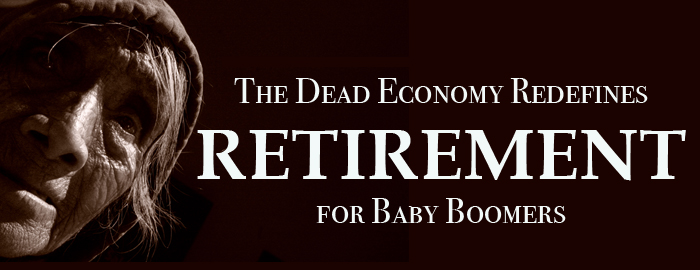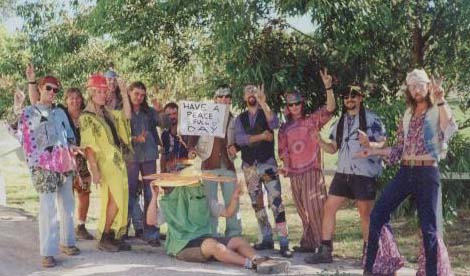

Introduction by Dan Eden for viewzone.com
When I was younger I lived in a commune. It was just after I finished my undergraduate degree. There were about 12 of us who lived in a big farm house surrounded by asparagus fields and woods, just minutes away from the campus at the university. We all had our own "space" in our small bedrooms, but we shared a common kitchen, living room and bathrooms. It was cheap and sometimes there was conflict, but these were some of the best years of my life. Lots of us from that golden era -- the "hippy" culture -- have survived the wars and surrendered the culture to younger generations only to find that we now face the most difficult times. The death of capitalism has left us too old to find work, our 401k plans are depleted and the prospects for a dignified, relaxing "passing away" have most certainly been denied. What can you do when you are in your 60's and have only meager savings? Intrude on your children to take care of you? Live a lonely and austere existence that guarantees depression and other mental health issues? Live in a shelter or urine smelling rest home? When the hippy culture officially died, most of us cut our hair and took jobs, raised families and walked in lock step to the corporate culture. We forgot the social skills that facilitated group living and sharing and fell victim to the greed of individual materialism. Since then, no other generation has attempted the social experiment that the "baby boomers" initiated 40 years ago. But I think the present crises will ignite a new era of communal survival. In the following article, taken from alternet.org, the suggestion is made that retirement aged people could pool their meager resources and build survival communities. I think this a great idea. I have previously written about the impending 2012 natural catastrophe and how it will change life for everyone. Despite the solid science relating to the solar cycles and galactic alignment, many people choose to cope with these facts by dismissing it as a "tin foil hat wearing conspiracy." So be it. But the financial death of America is no conspiracy. Taken together, the prospects of the immediate future require that we start thinking in terms of survival and "emergency times." We'll be exploring the idea of communal life in more articles on viewzone.com, but the following article is an appetizer. We'd like your comments. Thanks, Dan
Is the Future Going Down the Drain? By Alexander Zaitchik
It all happened faster than you can say "senior discount."
Millions of baby boomers born into the dawn of the most spectacular economic expansion in history are being forced to re-imagine their retirement futures. Few news outlets have failed to seize upon the low-hanging pun: the boomers have gone bust.
Among the adjustments forced by the new circumstances, perhaps the cruelest twist for many boomers is the need to join younger generations in the roommate queue. The housing crash has forced record numbers of late-middle age homeowners to take in boarders or risk becoming boarders themselves. From California to Vermont, home-share organizations founded to assist the elderly are scrambling to meet the demands of newly bust boomers.
"In the last few months we've experienced explosive growth in interest by homeowners age 50-plus to find rooms and roommates," says Jacqueline Grossmann, Chicago coordinator for the National Shared Housing Resource Center. "The trend now is getting younger and younger. People in their 50s and 60s are losing their nest eggs and increasingly willing to give up their privacy in exchange for rents of $500, $600 a month."
"We've seen a 400 percent increase over the last few months of people nearing retirement age," says Rita Zadoff, director of Housemate Match, a shared-housing program serving the Atlanta area. "We haven't been this busy since we helped Katrina victims find housing."
Kirby Dunn of Home Share Vermont reports a "huge increase" of boomers seeking roommates in the last six months. "There has been a dramatic shift from elderly clients seeking a 'protective presence' to younger people with 'too much house' seeking financial help to make mortgage and utility payments," she says.
Most of the nation's home-share organizations were set up with the disabled and seniors in mind. They now appeal to bust boomers because they are generally free services that screen potential housemates carefully. "Older people aren't comfortable finding roommates through Craigslist," says Zadoff. "They aren't as used to the idea of letting strangers into their homes."
Boomers are maximizing room occupancy for the same reason that their kids in their 20s and 30s are still competing for the best group rentals on Craigslist: they're broke.
The extent to which boomer wealth was based on home values is highlighted by a new report from the Center for Economic and Policy Research, entitled "The Wealth of the Baby Boom Cohorts After the Collapse of the Housing Bubble." The report details how the collapse has left the majority of those around retirement-age almost completely reliant on entitlements. The net worth of median households in the 45 to 54 age bracket has dropped by more than 45 percent since 2004, to just over $80,000. Households headed by those aged 55 to 64, meanwhile, have lost 38 percent of net wealth.
"The collapse of the housing bubble has already destroyed almost $6 trillion dollars in housing wealth for homeowners," says report co-author Dean Baker, who testified last month before the Senate Special Committee on Aging. "This is compounded by the recent collapse of the stock market. The result is that many baby boomers will only have entitlements to rely on in their retirement."
Make that entitlements, roommates, and each other.
As more and more boomers scale down their retirement plans and consider alternative living arrangements, it's worth asking: Is shared housing such a bad thing for aging boomers? Does a return to the Communal idea, borne of economic necessity, also have emotional, social, and environmental benefits? Why wait for the retirement home or hospice to live with other people? With the nation full of worthless, ridiculously large, and mostly empty houses, why not fill them with the newly penurious and like-minded boomers in need of housing?
Better yet: why not abandon these suburban houses altogether, and find more appropriate housing arrangements closer to urban cores, or build tightly knit communities on cheap rural land?
"Cooperation is the watershed in grappling with this economic downturn," says Charles Durrett, of McCamant & Durrett, a pioneering architectural firm that specializes in ecologically sensitive shared housing projects for seniors and low-income people. "It doesn't make any sense -- economically, emotionally, environmentally -- for retired people to be living in these isolated homes and ranchettes, making thousands of individual trips to the grocery store and pharmacy."
Terry S., a 62-year-old self-employed divorced psychologist in Pittsburgh, is one boomer considering the cooperative housing route. Until the crisis hit last year, Terry planned to spend her retirement between Europe and New York City, living off her IRA and savings. But the crash saw her wealth plummet by 60 percent. "My friends and I feel betrayed because we are now in the same or worse position than those who never saved their money, but may have a pension," she says. The crisis forced her to rethink retirement, and now plans to buy a house with her friends. She explains the logic:
For those who can't afford to buy a comfortable retirement home with friends, there is a proliferating number of larger, shared-income communities with low financial thresholds. Known as "Intentional Communities” these small village-like settlements allow like-minded retirees to pool their economic resources and support each other during their "second journey." While historically there has been no direct correlation between economic conditions and growth in America's commune movement -- the greatest spike occurring during the boom decade between 1965 and 1975 -- the current economic downturn is dovetailing with a rise in the number of such communities around the country.
Tony Sirna, a veteran of communes and the Fellowship's web manager, says that while many people are currently drawn to income-sharing communities because of financial straights, he suspects many will stay on because of the social and cultural benefits of living with others and sharing resources.
"As a generation, boomers have a unique relationship to the idea of Community," says Sirna. "Partly because of the Counterculture, many retirees are choosing to create non-corporate senior cohousing, as opposed to traditional senior communities in which they feel institutionalized." Sirna says many shared-income communities are now at maximum capacity for the first time in decades, with waiting lists full of retirees eager to live the shared, cooperative life.
If the deepening economic crisis does lead the boomers back to Countercultural values, a generation will have come full circle. Whether they end up living in a group house, a shared apartment, or a full-on hippie-style commune, studies show that they will live longer and more fulfilling later lives. "The results here are truly amazing," says Kirby Dunn, pointing to studies that gauge the effects of shared housing. "Across all programs and age-brackets, people say they feel safer, are less lonely, happier, and sleep better. They also call their family less often for help."
This last item is of particular interest to the boomers' kids. They may not have made it to the mortgage stage of the game before the crisis hit, but that doesn't mean they don't have their own problems at the moment.
Comments: Great article. I was just talking to some old "hippy" friends who are in similar situations and we joked about living on a farm together somewhere. Though we were joking at the time, I have been thinking -- no wishing -- that this would be possible. We all share a concern for the environment and more or less feel the same about spiritual things. At least we are tolerent of each other enough so I believe we could make it work. I worked in social services when I was younger and so dread the idea of going to a nursing home. I think I'd rather just die. Anyway... thanks for the hope... we use that word a lot these days. Kevin H.
|

 Some of my friends and I shared a communal house in the 70s. We first came up with this idea [of doing it again] when we were talking about the possibility of having to live in assisted living or nursing homes, and we decided it would be far better to all live together in a big house with friends we knew and loved and hire a nurse and a cook. One of my friends owns a construction firm and he says he can put an elevator in any home for less than $100,000. We have looked at several homes. One was a beautiful house that backed onto a huge city park and had a pool decks all around and could easily be converted into four private residences. It was $600,000, which would only be $150,000 per unit. Much less than the $4,000 a month to have half of a dingy room in a nursing home that smells like urine.
Some of my friends and I shared a communal house in the 70s. We first came up with this idea [of doing it again] when we were talking about the possibility of having to live in assisted living or nursing homes, and we decided it would be far better to all live together in a big house with friends we knew and loved and hire a nurse and a cook. One of my friends owns a construction firm and he says he can put an elevator in any home for less than $100,000. We have looked at several homes. One was a beautiful house that backed onto a huge city park and had a pool decks all around and could easily be converted into four private residences. It was $600,000, which would only be $150,000 per unit. Much less than the $4,000 a month to have half of a dingy room in a nursing home that smells like urine.